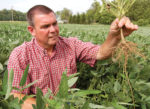Advertise Follow Us
Items Tagged with 'Compost'
ARTICLES
Soil Health
Father of biological farming, Gary Zimmer, shares his controversial philosophy on no-till and common misconceptions about good soil health
Read More
In Depth: The Money-Making Power of Soil Microbes
Reducing soil disturbance, increasing plant diversity and adding livestock to farms accelerates soil health and productivity, helping growers stay profitable, soil experts say.
Read More
Biofertilizers Helping No-Tillers Save Money, Fix Soils and Boost Yields
With a little time investment and a cheap source, soils and crops can benefit from biosolids, compost, biochar, sea plant extracts and other natural products.
Read More
Obsession With Soil Health Paves Way For Better No-Tilling
Indiana no-tiller Dave Chance uses a combination of compost, cover crops and vertical tillage to tame high-clay soils and boost yields.
Read More
Ideas And Imagination Leading To No-Till’s Second Revolution
Researchers are discussing, and even experimenting with, possibilities that could make their way into your field management strategies and no-till profits.










